Tile and grout are some of the most commonly used materials in home improvement and construction projects. They are also notoriously difficult to clean.
If you have ever tried to clean tile and grout with a store-bought cleaner, you know how frustrating it can be. And it’s difficult to know where the problem lies; are you using the right kind of scrub brush?
It seems like most grout cleaners are just not strong enough. Most have bad reviews and the ones that may be good, like Zep Grout Cleaner, are very expensive. What kind of grout cleaner should I be using?
The good news is, you don’t have to commit to using store-bought grout cleaners. Some of the best grout cleaners are made using common household ingredients. AND- making your own homemade grout cleaners is easy.
This article is going to help! We will show you how to make the best homemade grout cleaners using just a few simple ingredients!
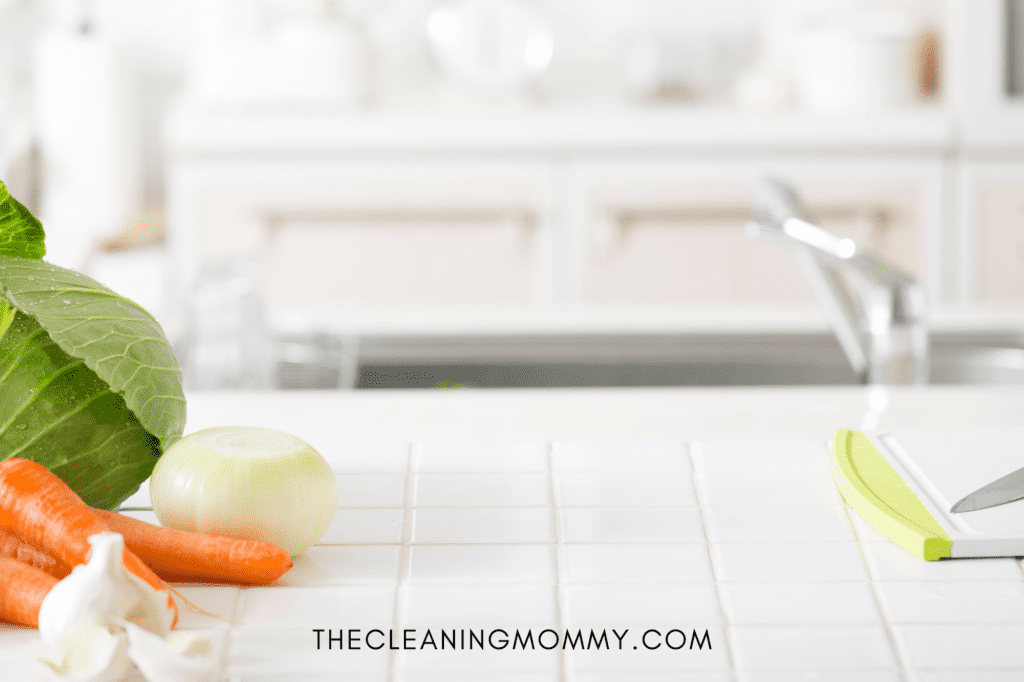
Half Vinegar, Half Baking Soda Homemade Grout Cleaner Recipe
- Vinegar
- Baking soda
- Water
- Lemon juice (optional)
To make this cleaner, simply mix together equal parts vinegar and water. If you’re using a gallon bucket, mix a cup of each ingredient in the bucket.
Add in a tablespoon or two of baking soda to the gallon bucket, and then add a few drops of lemon juice if you want to give it a fresh scent. With this cleaner, not only can you mop floors easily. You can use this solution on dirty grout with a scrub brush.
Is vinegar safe to use on bathroom grout?
Grout lines can be ruined by vinegar. Nevertheless, this only applies to non-sealed grouts.
Unsealed grout is vulnerable to vinegar penetration due to the air spaces that are present within it. As vinegar remains in these spaces for long periods of time, it will corrode grout.
There will eventually be wear and tear on the grout. Vinegar shouldn’t be applied to areas with an unsealed grout line for cleaning purposes.
If you make the effort to seal grout regularly, vinegar won’t corrode it. The grout in this case should not be affected by vinegar since it has been sealed.
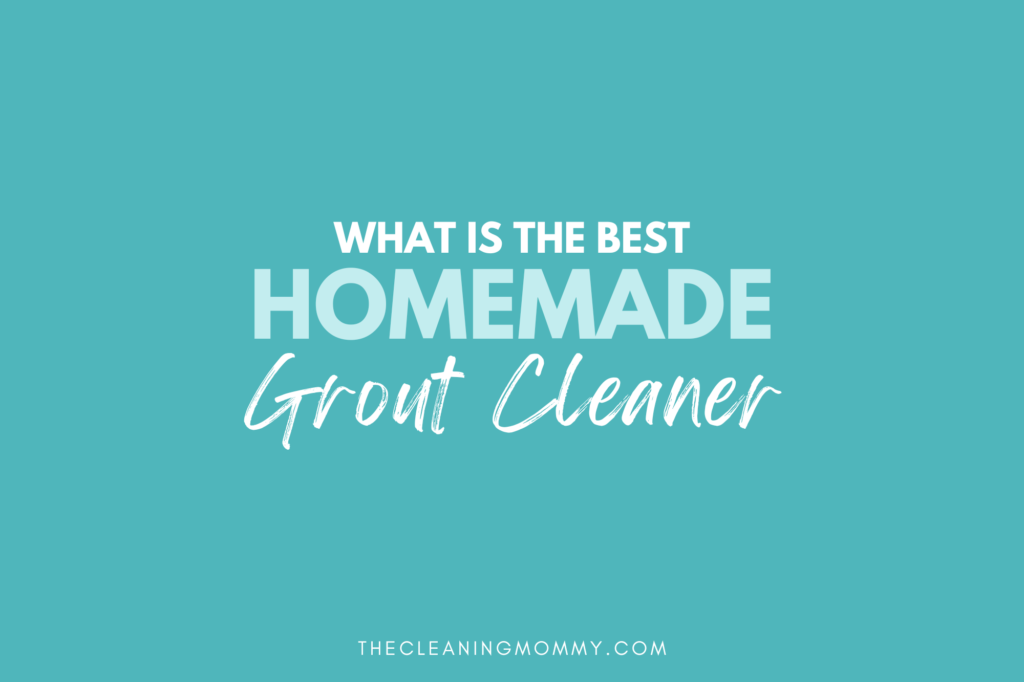
Homemade Grout Cleaner Recipe With Epsom Salts
If your tile grout is looking dingy, there’s no need to call in a professional. You can easily clean dirty grout yourself using a simple solution of Epsom salts, baking soda, and dish soap.
Just mix together the ingredients and rub onto the tile and grout. Rinse well and enjoy the fresh, clean look of your tile grout. This homemade grout cleaner is gentle enough to use on a regular basis, so you can keep your tile looking new for years to come.
- 1 cup Epsom salts,
- 1/2 cup baking soda,
- 1/4 cup liquid dish soap
In a gallon bucket, combine the Epsom salts, baking soda, and dish soap, and stir well. Mixture should be scooped out onto the grout and rubbed clean with a soft cloth or brush. Follow by rinsing.
Are Epsom salts good for homemade grout cleaner recipes?
The coarseness of Epsom salts makes them an excellent scrub for hard-to-reach surfaces like tiles and grout lines. Epsom salt can be applied to grout or tiles with a little liquid soap, scrubbing it with a grout brush, and rinsing it off afterwards.
It might be a good idea to test a small area first to make sure you won’t damage any tiles or colored grout.
Homemade Grout Cleaner with Hydrogen Peroxide
Tile and grout lines are susceptible to mold and mildew, soap scum, and other deposits that can be difficult to clean. However, hydrogen peroxide is an effective grout cleaner and brightener that can safely remove these deposits. In fact, due to its oxidizing qualities, peroxide mixed with baking soda may be the ultimate grout cleaner. PLUS it is totally safe to use on natural stone.
To use hydrogen peroxide for cleaning, simply apply it to the affected area with a cloth or brush. For best results, let the peroxide sit on the surface for several minutes before wiping it away.
In most cases, a single application will be enough to clean grout areas thoroughly. However, stubborn deposits may require a second application.
Hydrogen peroxide is a robust cleaning agent that effectively removes deposits from tile and grout lines. It is safe and gentle when used properly, making it an ideal choice for home cleaning. It is also an excellent mildew stain remover for shower tile, kitchen tile grout, or floor tile grout.
To make a hydrogen peroxide based grout cleaner, mix together:
- 1/2 cup of baking soda,
- 1/4 cup of hydrogen peroxide,
- 1 tsp dish soap.
Then, spoon the mixture onto the grout and wait 5-10 minutes. Next, scrub with a grout brush and rinse. For tough stains, or very porous grout, a second application may be required.
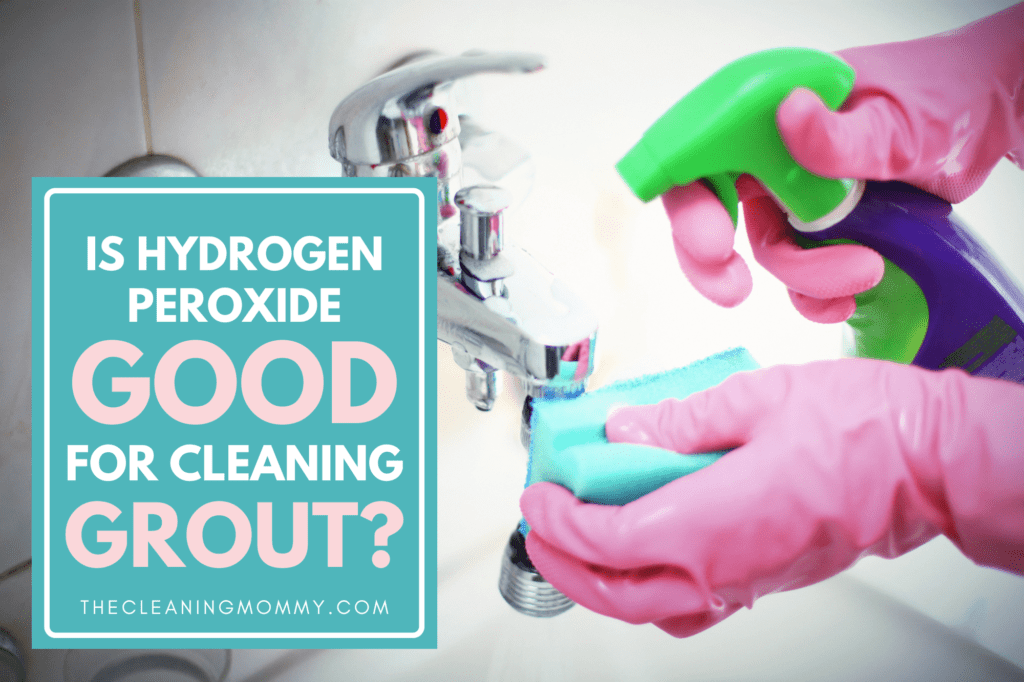
Is Hydrogen Peroxide good for cleaning grout?
Hydrogen peroxide is often used as a natural alternative to chemical cleaners. It is safe for use on grout, and when combined with baking soda, it produces oxygenated bleach – a highly effective cleaning agent. Hydrogen peroxide is available in different strengths, and the 3% solution is typically recommended for cleaning.
When using hydrogen peroxide to clean grout, it is important to take precautions to avoid damaging the surrounding surfaces. The best way to do this is to apply the hydrogen peroxide directly to the grout lines using a sponge or brush.
Once the hydrogen peroxide has had a chance to work its way into the grout, you can rinse it away with clean water. For best results, repeat this process once a week.
Alternative Hydrogen Peroxide method for cleaning grout
When it comes to cleaning grout, there are a few different options available. You can buy a commercial grout cleaner, or you can make your own cleaning solution at home.
If you choose to make your own cleaning solution, one option is to mix together baking soda and hydrogen peroxide.
To use this method, simply sprinkle the baking soda onto the grout until it is covered. Then, spray the area with hydrogen peroxide until it is wet. Wait ten minutes, then scrub the grout with a brush.
Finally, wipe the area clean with a damp cloth. This simple cleaning recipe can be used on most types of grout, and it is an effective way to clean tiled areas.
Essential Oil Recipe For A Homemade Grout Cleaner
If you’re looking for an effective and all-natural way to clean your bathroom grout, look no further than this simple DIY grout recipe. Baking soda, lemon juice, salt, dishwashing liquid, vinegar, and essential oil come together to form a powerful cleaning solution that will leave your grout looking good as new. Just mix all of the ingredients together in a bowl, then transfer to a spray bottle and get to work. spray on the gr
out, let sit for a few minutes, then scrub with a brush and rinse with water. You’ll be amazed at how well this natural cleaner works!
Ingredients:
- 3/4 cup baking soda,
- 1/4 cup lemon juice,
- 3 tbsp salt,
- 3 tbsp hand dishwashing liquid,
- 1/2 cup vinegar,
- 7-10 drops of your favorite essential oil

Are essential oils good for grout?
If your tile is looking a little bit grungy or you have stained grout, then it might be time to give it a good cleaning. However, sometimes traditional cleaners just don’t cut it. That’s where lemon and lemongrass essential oils come in.
Both of these oils are known for their disinfectant and cleaning properties. When used together, they can help to remove even the most stubborn dirt and grime as a homemade grout cleaner.
To use them, simply add a few drops of each oil to a cup of water and mix well. Then, use a sturdy sponge or brush to scrub the solution into the tile. Let it sit for a couple minutes before rinsing away with clean water.
You’ll be amazed at how much brighter and cleaner your tile will look.
Washing Soda Recipe For Homemade Grout Cleaner
Are you looking for an effective, homemade grout cleaner? Look no further! This recipe is simple and only requires a few ingredients that you likely already have around your home.
Simply combine washing soda, vinegar, and dish soap in a one-gallon container. Slowly pour water into the container, being careful not to splash. Once the mixture is fully combined, pour it into a spray bottle.
To use, simply spray the floor and let the mixture sit for a few minutes. Then, clean the area with a grout cleaning brush. You’ll be amazed at how well this cleaner works! Plus, you’ll feel good knowing that you’re using a natural, homemade cleaner instead of harsh chemicals.
Ingredients:
- 1-gallon water,
- 1/4 cup washing soda,
- 1 tbsp dish soap
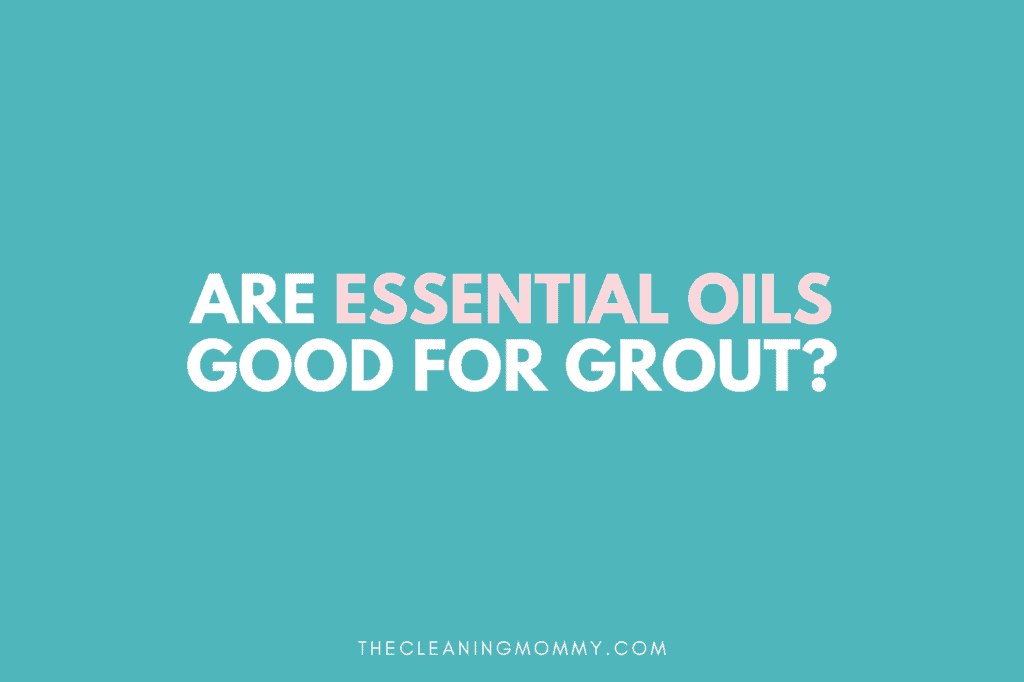
Is washing soda good to use on grout?
You may be surprised to learn that washing soda can be used all over your bathroom, including on tiles and grout. Washing soda is a powerful cleaning agent that can remove tough dirt and grime. When used on tiles and grout, it can help to brighten the surface and make it easier to clean.
To use washing soda on tiles and grout, simply make a paste of washing soda and water. Apply the mixture to the surface and scrub with a grout cleaning brush. Rinse the area with clean water and dry with a soft cloth.
You’ll be amazed at how much brighter your bathroom will look after using this simple cleaning trick.
Homemade Grout Cleaner with Castile Soap
It can be tough to keep your tile and grout looking clean. Over time, dirt, grime, and soap buildup can leave your colored grout looking stained and discolored. While there are a variety of cleaners on the market, they can be expensive and contain harsh chemicals.
A more natural and cost-effective option is to make your own grout cleaner using castile soap. Simply mix together hot water, vinegar, castile soap, and essential oil in a bucket and mop your floor as usual.
The vinegar will help to break up dirt and grime, while the castile soap will disinfect and cleanse. The essential oil will leave your floor smelling fresh and clean. With this simple DIY grout cleaner, you can keep your tile and grout lines looking like new.
Ingredients:
- 1-gallon hot water,
- 1/4 cup vinegar,
- 2 tbsp Castile soap,
- 6-10 drops lemon essential oil
Is Castile Soap good as a grout cleaner?
Castile soap is an amazing product that can be used for a variety of cleaning tasks, including grout cleaning. This soap is made from natural ingredients, and it is very effective at breaking down grease and dirt to clean grout naturally.
A castile soap can help break down particles and remove residue from greasy grout or excessive dirt. As well as being very gentle, this soap will not damage surfaces. Aside from its affordability, castile soap offers great value for your money.
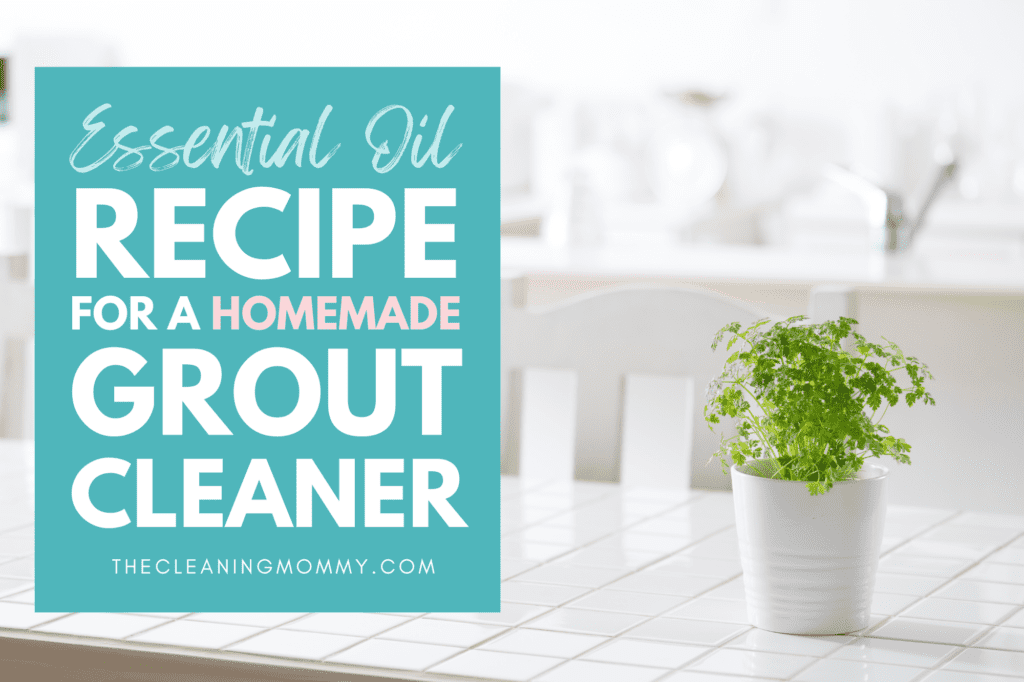
Homemade Grout Cleaner with Dawn Dish Soap
Over time, dirt, soap scum and grease can build up on tile surfaces, making them difficult to clean. Store-bought cleaners may not always be effective at removing this tough buildup.
However, a homemade grout cleaner made with Dawn dish soap can be highly effective. Dawn contains surfactants that help to break down grease and oils, which can bind dirt to surfaces.
When used as part of a regular bathroom cleaning routine, this cleaner can help to keep tile surfaces looking their best.
For the best results, be sure to use a non-abrasive sponge or cloth when scrubbing, and rinse the area well afterwards. With a little effort, your tile surfaces will shine like new.
Is Dawn ok to use on grout?
Grout lines are prone to collecting dirt, grime, and soap scum. When this happens, it can be difficult to get the lines clean using only water and a brush. For more modern epoxy grout it is safe to use vinegar along with Dawn. This would be for finished ceramic tile only! DO NOT USE VINEGAR ON NATURAL STONE!
A simple solution is to mix vinegar and water in a 1-to-1 ratio. This can be done by heating a cup of water in the microwave for one minute and then adding a cup of vinegar.
The mixture can then be poured into a spray bottle and Dawn dish soap can be added. The spray should be directed at the grout lines and left to sit for five to ten minutes.
If the grout is particularly dirty, the mixture can be left to sit for longer. After the allotted time has passed, the grout should be scrubbed with a brush and rinsed with water. The end result will be clean and fresh-looking grout lines. All thanks to using a handy homemade grout cleaner with Dawn!

The Best Way To Clean Using A Homemade Grout Cleaner
Now that you have several homemade grout cleaners to choose from, you can begin cleaning your dirty grout. But what is the best way to do this? First, select a homemade grout cleaner to try cleaning grout with.
How to clean grout lines and tiles
- Let the grout cleaner sit for a while. If you let your favorite cleaner dwell for a few minutes before you start scrubbing, you’ll get the best results when cleaning grout. If you want to clean tile grout, let the cleaner sit on the surface for five to ten minutes, and then scrub it out with a stiff brush. This works for shower grout, colored grout, or any kind in your home.
- The best way to clean grout lines is with a firm brush. A porous material like grout allows liquids to pass through it through minute spaces or holes. These tiny spaces are great traps for dirt and grime. It is easier to mop or wipe all the grout clean by scrubbing it with a stiff scrub brush. Or, you can also use a toothbrush with stiff bristles.
- The first thing you should do is scrub the floor and then mop it. After scrubbing the grout clean, make sure you vacuum up any excess baking soda with a broom or wet/dry vac, and finish by mopping the entire tile floor with a damp cloth (or mop) to make sure it is clean. If you would like to clean your floors, use a gentle floor cleaner combined with warm water and a few drops of dish detergent. After the final rinse, you will be able to remove any remaining grout cleaner from your floor, leaving it shiny and clean.
How often should I clean grout?
Grout is a versatile building material that can be used in a variety of applications, from tile floors to showers. While it is incredibly durable, grout is also porous and can absorb stains over time. For this reason, it is important to clean grout on a regular basis.
Depending on the amount of traffic in the area, grout should be cleaned every few months to once a year. For areas with heavy traffic, such as kitchens and bathrooms, weekly or biweekly cleaning may be necessary.
The best way to clean grout is with a brush and a mild detergent (like one of our homemade grout cleaner recipes above). Scrubbing the grout lines with a toothbrush can also be effective at removing dirt and stains. Just be sure to rinse the area well afterward to avoid damaging the tiles. With proper care, while cleaning grout, it will stay looking like new for years to come.
Remember, when you create your own homemade grout cleaner to clean grout, it’s more economical and you’ll be able to clean dirty grout more often. Hopefully, our suggestions can provide you with the best homemade grout cleaner recipe for your needs.
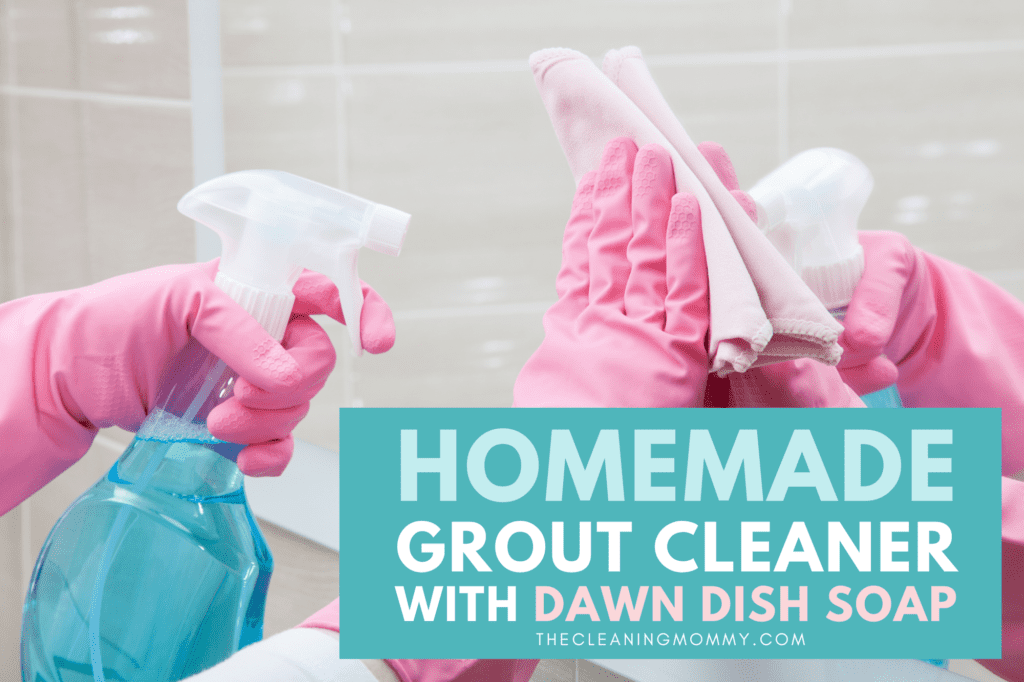
Grout Cleaning FAQ
What do professional cleaning services use for cleaning grout?
To clean grout, professionals rely on a simple solution of white vinegar and water. The vinegar helps to break down the dirt and grime, while the water rinses it away. This solution is often more effective than Dedicated Ph-neutral grout cleaners because it is more acidic.
However, it is important to use a 1:1 ratio of vinegar to water to avoid damaging the grout. For particularly stubborn stains on dirty grout, professionals may also use a stiff brush or toothbrush to scrub the grout clean.
What kind of brush is best for cleaning grout?
When it comes to cleaning grout, you want a brush that is both stiff and sturdy. A long handle will also give you more leverage to apply pressure as you scrub.
Scrub pads can be an effective alternative, but they need to be robust enough to handle the abrasiveness of the task. In a pinch, a toothbrush is always an acceptable grout cleaner.
In general, look for a brush with stiff bristles and a strong handle (for floors). This will give you the best results for cleaning grout (along with a homemade grout cleaner solution).
What exactly is grout?
Grout is a porous cementitious material that is used to fill in the spaces or cracks between tiles. It creates a smooth, solid surface that makes tile stand out.
The most used type of grout is cement, which is made from a mix of water, cement, and (sometimes) sand. Cement grout is strong and durable, but it can be difficult to work with. For this reason, many homeowners choose to use pre-mixed grout, which is easier to apply and doesn’t require as much mixing.
Pre-mixed grout also comes in a variety of colors, so it’s easy to find one that matches your tile. Whether you choose cement grout or pre-mixed grout, make sure to follow the manufacturer’s instructions carefully to ensure the best results.
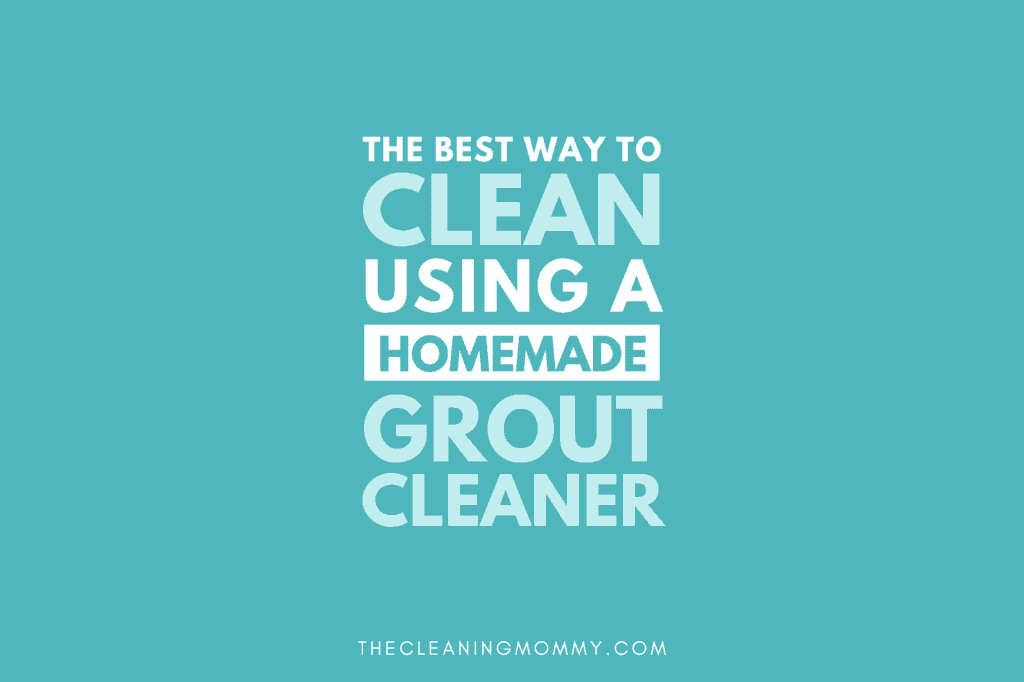
Additional questions on grout
Why should I seal grout?
The grout sealant prevents natural deterioration, daily wear, and keeps tiles cleaner for a longer period of time. There are many sealers available that protect unglazed tiles and grout from staining, mildew, bacteria, and other problems. It is expected that the tile and grout sealer will last about a year if properly applied (by a professional).
The best time to apply a grout sealer is after the tile installation is complete and the grout cure time has elapsed. This will allow the grout joint to fully harden so any joint movement will not be “sealed” into place.
Applying a grout sealer is easy – simply spray or brush it on! But remember, when it comes to choosing a grout sealer, always select a solvent-based silicone sealer for best results. Water-based sealers may cause efflorescence (a chalky white powdery substance) on some types of stone tile.
So if you are looking for an easy way to extend the life of your tile installation and make cleaning a breeze – be sure to ask your professional tile installer about sealing your grout joints!
Is grout a breeding ground for bacteria?
A tile installation wouldn’t be complete without grout, but it is also one of the most difficult parts to keep clean. Grout is porous and will hold onto dirt more easily than the solid tile material.
Over time, dirt and bacteria can build up in the pores, leading to grout discoloration, and making it difficult to remove. As a result, many homeowners are concerned about the possibility of bacteria collecting in dirty grout.
Fortunately, you can prevent this from happening by taking a few steps. It is important to seal your grout on a regular basis. Dirt and bacteria won’t be able to penetrate the surface of sealed grout as a result of this filling in of pores.
Maintaining a regular grout cleaning schedule is also important. Dirt and debris can be gently scrubbed away using a mild cleanser and a stiff brush. By using one of the best homemade grout cleaner you can find, maintaining clean grout and keeping bacteria at bay is easy.

Conclusion
When it comes to cleaning grout, there is no one-size-fits-all solution. The best homemade grout cleaner for you will depend on the level of mess you’re dealing with, and your own personal preferences.
For light cleaning, a simple mixture of baking soda and water can work wonders. Just apply the paste to the grout, let it sit for a few minutes, and then scrub it away with a brush.
For tougher jobs, you may need to use a stronger cleaner such as vinegar or hydrogen peroxide. You can also add a few drops of essential oil to any of these solutions to give your grout a fresh scent. We do not recommend bleach based cleaners as they are harsh and not healthy to be around. While they will whiten grout, over time they can damage grout and lead to replacement.
Whichever cleaner you choose, be sure to rinse the area well afterward to remove any residue. With a little elbow grease and the right ingredients, you’ll have your grout looking like new in no time! Hopefully, our picks of the best homemade grout cleaner will help you keep clean grout in your home.
Other Cleaning Articles You May Like:
- How To Clean Toilet Jets The Easy Way
- How To Remove Black Mold From Shower Caulk
- How To Remove Rust Stains From Porcelain Bathtub
- How To Clean a Bathroom Sink Overflow Hole
- Best way to clean kitchen tiles
- 3 of my best methods to make your own diy eyeglass cleaner

Grainne Foley
Grainne Foley is a wife and mother of 2 great kids. During her 5 years of full time RV travel, Grainne learned to become very efficient at household chores, in order to make time for family adventures. Now, back in a house, she has continued to create tools and techniques to help others lighten the load of household organization and cleaning.
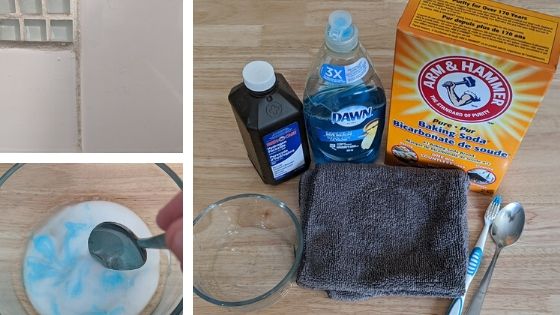


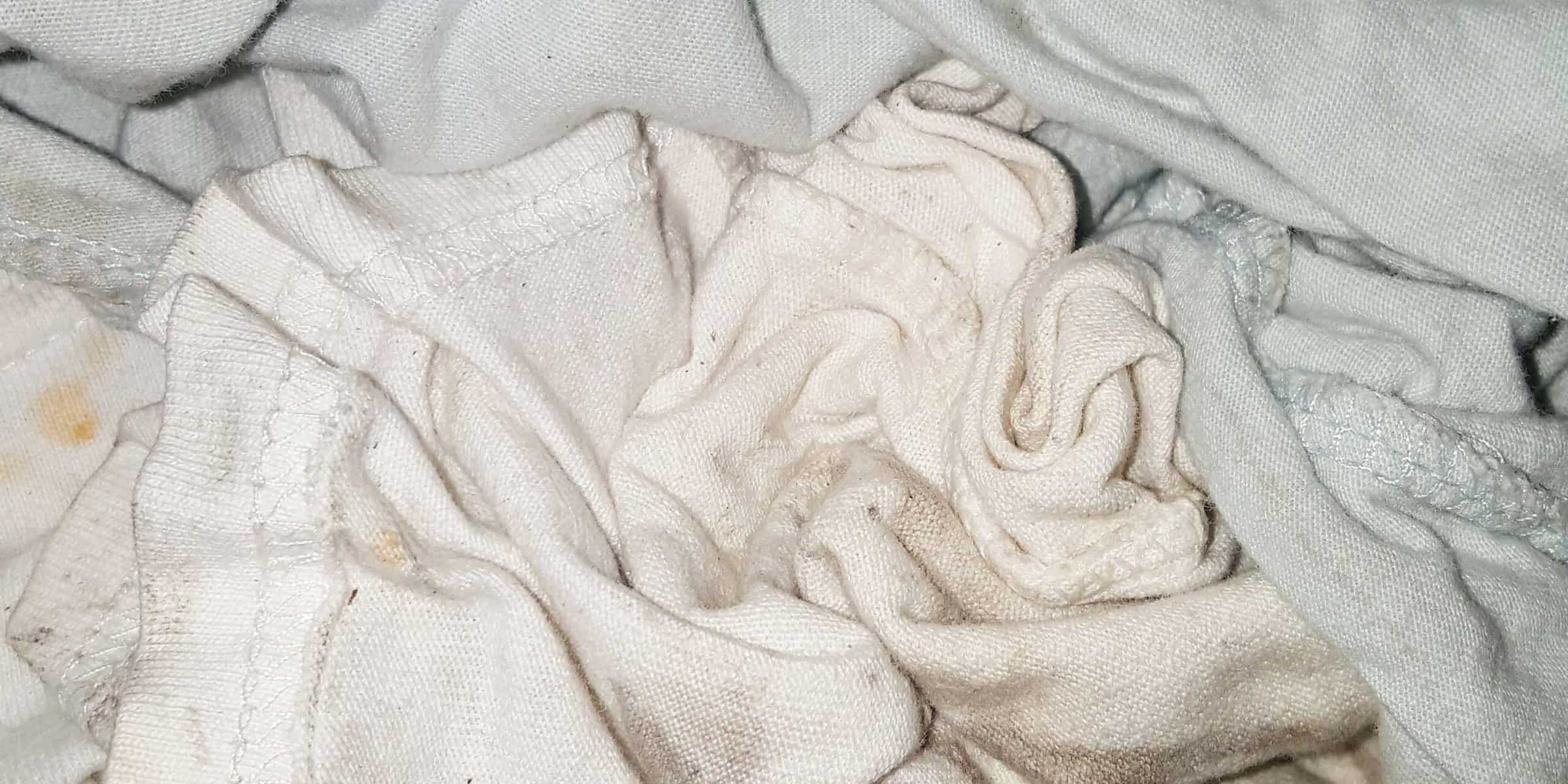
Leave a Reply